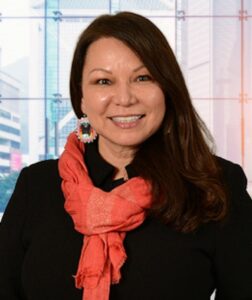Madahbee Leach confident Indigenous people can become clean energy world leaders

By Sam Laskaris
AUNDECK OMNI KANING FIRST NATION – Dawn Madahbee Leach knows who she believes should be at the forefront of clean energy projects.
“Indigenous people can be leaders globally on clean energy,” Madahbee Leach said at a presentation at the Indigenous Clean Energy E-Gathering on Jan. 22. “I think that’s our role as stewards of the land.”
The five-day event, which featured various clean energy themed presentations, concluded on Jan. 22.
Madahbee Leach, the vice-chair of the National Indigenous Economic Development Board, was one of six speakers for a presentation that focused on how Indigenous clean energy participation continues to be a major economic development-driver for First Nations, Métis and Inuit communities and peoples.
Madahbee Leach, a member of Aundeck Omni Kaning First Nation on Manitoulin Island, reiterated two words throughout the presentation— capacity and collaboration.
“I feel that building capacity is the most important thing we can do right now in terms of clean energy,” she said.
Madahbee Leach also said that it was about a year ago the International Organization for Economic Co-operation and Development launched its first-ever report on Indigenous economic development.
“That report has all kinds of recommendations to the federal government and they do these reports to their member states,” she said. “That report provides a lot of recommendations but there’s some things in there we can do as Indigenous peoples ourselves. We don’t have to wait for the federal government to do these things.”
For example, building capacity. Madahbee Leach said the report included information about building Indigenous centres of excellence, which can be utilized as clearinghouses of leading practices, leading research, case studies, tools and templates to help communities make informed decisions.
“We would have a better chance to make informed decisions, to make better partnerships, to really be leaders in this industry because we would be looking at the leading practices and Indigenous businesses involved in clean energy projects and our employees and how to manage these projects,” she said.
Madahbee Leach also believes better collaboration would lead to better results.
For example, she brought up a wind power project constructed on Manitoulin Island.
“It was really difficult because our people didn’t know too much about the industry at the time,” she said. “We missed some opportunities.”
Madahbee Leach added that just one Indigenous-owned company provided services to the project.
“Their involvement opened doors for them,” she said, adding the company has been invited to participate in other projects across the country.
Madahbee Leach would have preferred to see other Indigenous companies involved as well.
“I know we probably could have benefitted more,” she said. “I’m worried that a lot of the projects we have are more passive investments where we have partners that take on the major role. I think there’s so much opportunity again in collaborating and building that capacity to be sole owners of some of these projects.”
Madahbee Leach said learning from successes as well as missteps is the best way to move forward.
“My vision is to build our own expertise and capacity as a way to be at the forefront of this sector in a more meaningful way where we can generate the revenue to meet our community needs, we develop ownership models that incorporate social returns and wealth equally, where we have experienced Indigenous companies and employees building and managing the energy infrastructure,” she said.
Madahbee Leach also believes sharing not only successes but areas where improvement is required can be far-reaching.
“We are already building this capacity but we need to share our progress and our missteps so we can all learn to do better,” she said. “We can share our successes with our Indigenous brothers and sisters globally as well.”

